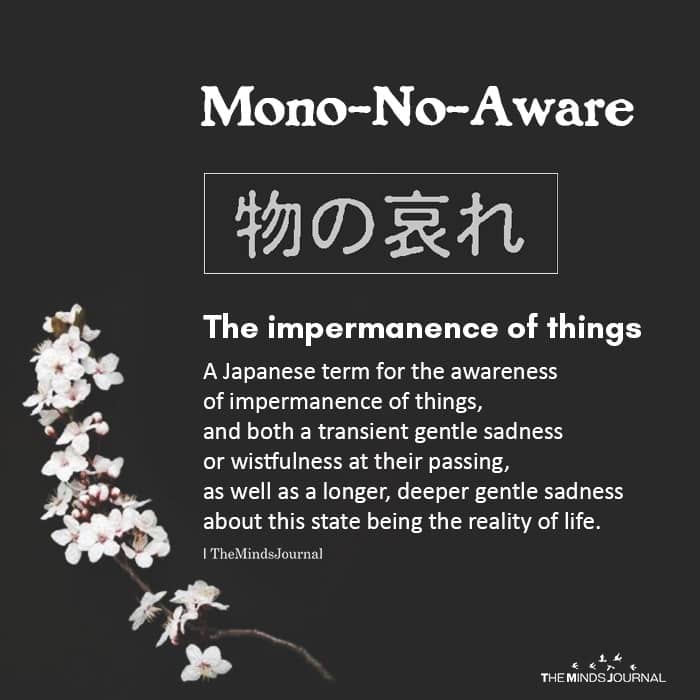The Japanese term Mono No Aware urges us to realize and appreciate the impermanent nature of things and cherish the beauty of transience.
What is mono no aware?
Rich with meaning and subtlety, the soul of Mono-no aware is often difficult to successfully describe in words. However, the almost untranslatable term refers to the melancholic realization that everything is temporary. It is the awareness of the fleeting nature of things. Literally translated to “the pathos of things”, it means an empathy or sensitivity towards things that transient and last only for a short period. This Japanese phrase for awareness of impermanence involves both feelings of joy and sadness as this is the truth of life.
Whether it’s the changing of seasons, the fading of youth, or the impermanence of love, all things should be cherished for their transitory nature instead of being mourned. When we learn to do that, we learn to appreciate the true beauty of everything.
Mono No Aware can be best explained as “the ephemeral nature of beauty.” It refers to the subtle bittersweet feeling you experience when you are aware that nothing is meant to last forever, no matter how good or bad. It is characterized by our appreciation and heartache of the transient nature of things, people, love and even life.

Read Mushin: How The ‘No Mind’ State Can Help You
Understanding Mono No Aware
Although it loses some of its true essence in translation, the literal translation of the term is “the pathos or sadness of things.” According to Japanese culture, the term ‘Mono’ refers to ‘things’, ‘aware’ refers to sentiment or feeling, and ‘no’ suggests the essence that something possesses.
Hence, mono no aware signifies the profound emotions certain things can evoke in us. It is linked to a touching feeling of temporariness, like everything in nature and the universe, that is both sad and beautiful.

This empathy towards impermanence is a feeling of wistfulness about the reality of life. Often referred to as “the ‘ahh-ness’ of things,” it is a gentle sadness that engulfs us as we realize the evanescence of love and life. When we become aware of the impermanent nature of things and life, we gain a greater appreciation for their beauty while feeling a deeper sadness at their fading away from our lives.
Tim Lomas, a researcher in positive psychology at the University of East London, explains “The term was coined by Motoori Norinaga, the eighteenth-century literary scholar.” {1} Norinaga observed that this emotion or mood held a crucial place in Japanese culture as it captured the pathos or sadness gained by being aware of the impermanent and fleeting nature of life.
Origins of the term
The term mono no aware originated during the Heian Period (794-1185) in Japan and was heavily influenced by Buddhist philosophies. The word, which denotes the fleetingness of material and carnal life, was widely utilized in Japanese literature during that period.
It is believed that the term ‘aware’ was initially used during the Heian period to express inarticulate and spontaneous feelings, such as “wow” “oh” or ‘ahh”. It is that feeling which has a strong impact on us in an involuntary yet immediate manner before we can actually express it in words.
However, the term was not widely used until the 18th century when Motoori Norinaga, a Japanese cultural scholar in the Edo period utilized the term in his literary criticism of The Tale of Genji. Eventually, the term became widely popular and became a key phrase in Japanese culture and tradition. According to Motoori Norinaga (1730-1801), understanding mono no aware requires us to recognize the essence and power of everything in nature and in the universe, “not just of the moon and the cherry blossoms,” and be moved by every little thing. {2}
The love for cherry blossom
Perhaps the best way to understand the concept of mono no aware is to understand the love of Japanese people for the beauty of sakura or the cherry blossom. The flower blooms for 2 weeks in the entire year, dies eventually and falls to the ground covering the streets in what seems like pink snow. Like the cherry blossom, the reality is most beautiful when observed at the moment between beginning and end, life and death.

Although cherry blossoms exist for a short period of time, that is exactly where the beauty lies. The blooming and falling of the cherry blossoms only make us appreciate it even more in a melancholic way. This is the reason why the Japanese celebrate this seasonal flower, which indicates the arrival of spring. Traditionally, crowds gather each year to picnic in gardens covered by the soft pink petals of Sakuras.
Even though the sakura blossoms may not be more beautiful than any other flower, it is the transient nature that makes them highly appreciated and valued. This is a prime example of the joy and sadness of mono no aware.
Researcher Tim Lomas explains “In Zen, the pre-eminent symbol of mono no aware is the cherry blossom.” The delicate fleeting beauty of the flower captures our attention, and our appreciation for its unique importance is enhanced by our awareness of its impermanence. However, if the blossoms were common or permanent then our appreciation for its beauty may have been less or even negligible.
Read Zen Koans: 5 Profound Paradoxical Riddles To Expand Your Mind
Buddhism and impermanence
Mono no aware is closely linked to the Buddhist philosophy of impermanence. In Buddhism, impermanence or Anicca is one of the basic characteristics of existence. As the human body changes from childhood to old age, similarly, everything else comes into existence and then dissolves.
Recognizing the truth of impermanence is a crucial step towards spiritual enlightenment in Buddhism.

The notion of mujō or impermanence is widely reflected in the sayings and writings of Dōgen, a 13th-century Zen master & philosopher. According to the Stanford Encyclopedia of Philosophy, Japanese Buddhist traditions indicate that awareness of the reality of existence should not be a reason for “nihilistic despair”, instead it should inspire us to be more mindful and appreciate the present moment and be grateful for the next moment that will be gifted to us.
Mono no aware and Buddhism
The concept of mono no aware is believed to be in genuine love with Japanese Buddhism, as it emphasizes the importance of understanding the impermanence of life. According to Japanese Buddhism, one should skillfully and willingly let go of all attachments towards things that are fleeting and transient.
However, the idea of mono no aware is also based on Shintoism, a religion originating from Japan, according to Berkley Center, Georgetown University. It is believed that the notion of mono-no-aware sprouted from traditional Japanese religion but is deeply rooted in Shinto beliefs. Moreover, the concept is also highly influenced by Buddhist principles. As Buddhism was introduced in Japan, the focus came on the transient nature of existence. This delicate and aesthetic concept urges individuals to recognize the beauty of transience in everything so that we connect with it on a deeper level and appreciate its impermanent nature.
Researcher Tim Lomas claims that recognizing, accepting, and appreciating the temporariness of life is one of the core beliefs of Buddhism, along with most other Eastern religions and philosophies. Although most of us desperately cling to people and things that are destined to change or dissolve, Buddhism liberates us from such bindings and enables us to gain a profound understanding of the true nature of reality and its unconditional acceptance.
This is where the significance of the concept of mono no aware comes in, believes Tim. He explains that this realization develops a mood of acceptance & aesthetic sensibility towards uncertainty and impermanence. It creates a state of mind that makes us better able to appreciate the ephemeral beauty of things. However, it should be noted that this awareness does not encourage us to celebrate or welcome the transient nature of things as an element of sadness is present in our appreciation of impermanence. The sadness associated with the loss of people, things, or experiences we love holds a great value and should not be overlooked. But this heavy feeling is infused with the joy that we had the opportunity to witness, experience, and enjoy this momentary beauty of life, regardless of its fleeting nature.
Read Equanimity In Buddhism: Understanding The Fourth Kind of Love
The beauty of ephemerality

Life is almost like cherry blossom. It blooms and then it fades away. But it leaves a stunning trail of its beauty which captures our attention before it dissolves forever.
Our appreciation of life, nature, reality, and existence is escalated by our realization of its impermanence and fleetingness. Just like we appreciated the delicate blossoms of sakura.
Make sure you appreciate everything that is special to you because the essence you experience now will soon fade away and it will never be the same again. Everything will come and pass. That is the very truth of reality. But that is not something to be mourned but appreciated.
As our lives change, as things pass, new things will come into our lives and lead to new experiences. Although the cherry blossoms die every year, they bloom again next spring. And that’s how it is in life. Appreciate the moment you are in. Cherish its transience.
Reference: 1. https://www.utc.edu/sites/default/files/2021-06/Untranslatable%20Words.pdf#:~:text=The%20term%20mono%20no%20aware,very%20center%20of%20Japanese%20culture 2. https://books.google.co.in/books?id=zCDgEP6m-kgC&pg=PA329&lpg=PA329&dq=To+know+mono+no+aware+is+to+discern+the+power+and+essence,+not+just+of+the+moon+and+the+cherry+blossoms,+but+of+every+single+thing+existing+in+this+world,+and+to+be+stirred+by+each+of+them%E2%80%99&source=bl&ots=1lZKLde-8O&sig=ACfU3U1-XNCG8gn3uOtMavQKa87skcvm1A&hl=en&sa=X&ved=2ahUKEwi08t2yqc7yAhUgzjgGHXg-BcAQ6AF6BAg0EAM#v=onepage&q&f=false










Leave a Reply